Bachelor of Science in Computing and Information Technologies
An information technology degree where you'll implement complex computing systems and become well versed in their management.
Program Overview
Information technology is found in every aspect of our lives: the workplace, our homes, the way we communicate, and in much of the entertainment we consume. IT professionals, therefore, are in great demand and highly valued. IT professionals are solution architects, identifying complex problems and creating custom solutions that help users meet their goals. They play an integral role in any modern organization, working on all phases of IT solutions from conception to development, testing, deployment, security, and management. In this information technology degree, you’ll learn to design, implement, and manage complex IT systems.
Students in the computing and information technologies major are characterized by their hands-on approach to technology. They are designers and builders, but primarily they’re enablers. Students approach complex problems and create custom solutions that help users meet their goals. They play an integral role in any modern organization, often working behind the scenes to deploy technology where it’s needed most.
That versatility is the core principle of our major. People are interacting with computers more than ever before. With that comes a need for professionals that have the broad practical skills to facilitate those interactions across a variety of sectors. Not only do computing and information technology students learn to implement complex systems, but they become well versed in their management as well. Every day, more companies are realizing the benefits that IT professionals bring to the table.
Mission Statement
Graduates of the Bachelor of Science in Computing and Information Technologies program will remain employable in IT or related professional positions in both the private and public sectors and will have the ability to rise to leadership positions in their organizations. They will continue to make contributions to the discipline and will demonstrate continued learning in their career.
Program Educational Objectives
The Computing and Information Technologies Program Educational Objectives (PEO) are broad statements that describe what graduates are expected to attain within a few years of graduation. Program educational objectives are based on the needs of the program’s constituencies. The Computing and Information Technologies faculty, in conjunction with its constituents, has established the following program educational objectives:
PEO 1: Graduates of the BS CIT program will remain employed in any IT or related professional positions in both the private and public sectors.
PEO 2: Graduates of the BS CIT program will demonstrate continued learning in their career through advanced study, advanced degrees, certifications, and similar activities.
PEO 3: Graduates of the BS CIT program will demonstrate an ability to participate on team-oriented activities and will rise to leadership positions in their organizations.
PEO 4: Graduates of the BS CIT program will make contributions to the discipline of computer and information technologies through participation in professional organizations, providing training, authoring articles, through scholarship, or similar activities.
Program Learning Outcomes
-
Analyze a complex computing problem and to apply principles of computing and other relevant disciplines to identify solutions.
-
Design, implement, and evaluate a computing-based solution to meet a given set of computing requirements in the context of the program’s disciplines.
-
Communicate effectively in a variety of professional contexts.
-
Recognize professional responsibilities and make informed judgments in computing practice based on legal and ethical principles.
-
Function effectively as a member or leader of a team engaged in activities appropriate to the program’s discipline.
-
Identify and analyze user needs and to take them into account in the selection, creation, integration, evaluation, and administration of computing-based systems
As more companies are realizing the benefits that IT professionals bring to their business, a graduate of the Bachelor of Science in Computing and Information Technologies will have the opportunity to work in small- to large-scale enterprise in any industry setting. You will be equipped to take on the system design, installation, configuration, operation, and support of computing system platforms, from mobile devices, servers, and large-scale systems to the deployment of clouds and the use of virtualization.
The BS degree in Computing and Information Technologies is designed to teach students to be the designers, implementers, operators, and maintainers of computing networks and the computing systems attached to the network. Students will evaluate existing networks and computing systems, suggest improvements, monitor such systems for faults, and plan for growth. They will have the opportunity to work in small- to large-scale companies in any industry segment that interests them.
An important goal of the major is to provide students with a level of specialization beyond that provided by typical information systems or information technology programs. To accomplish this, the major focuses on networks of all types and the full range of computing system platforms that can attach to them. In this way the degree program favors depth over breadth. It is this approach that allows faculty to guide students in their in-depth exploration of conceptual knowledge, which is enhanced with required cooperative education experiences.
The curriculum includes required core courses such as a programming sequence, introductory courses in database and security, and fundamental courses in Computing and Information Technologies.
Typical Course Sequence
|
Year One |
||
|
Course Code |
Course Title |
Credit Hours |
|
CSEC - 102 |
Information Assurance and Security |
3 |
|
GCIS - 123 |
Software Development and Problem Solving I | 4 |
|
GCIS - 124 |
Software Development and Problem Solving II | 4 |
|
General Education - Elective : Islamic Culture Course |
3 | |
|
MATH - 131 |
General Education - Mathematical Perspective A: Discrete Mathematics |
4 |
|
General Education - Artistic Perspective |
3 | |
|
NSSA - 102 |
Computer Systems Concept |
3 |
|
MATH - 161 |
General Education - Mathematical Perspective B: Applied Calculus |
4 |
|
COMM - 142 |
Introduction to Technical Communications (WI) |
3 |
|
UWRT - 150 |
General Education - First-Year Writing: UWRT-150 FYW: Writing Seminar (WI) |
3 |
|
YOPS - 010 |
RIT 365: RIT Connections |
0 |
|
Year Two |
||
|
NSSA - 241 |
Introduction to Routing and Switching |
3 |
|
NSSA - 220 |
Task Automation with Interpretive Languages |
3 |
|
ISTE - 230 |
Introduction to Database and Data Modeling |
3 |
|
NSSA - 221 |
System Administration 1 |
3 |
|
General Education - Ethical Perspective |
9 | |
|
STAT - 145 |
Introduction to Statistics 1 |
3 |
|
ISTE - 140 |
Web and Mobile 1 |
3 |
|
ISTE - 240 |
Web and Mobile 2 |
3 |
|
ISTE - 99 |
Co-op Prep Seminar |
0 |
|
Co-operative Education (Summer) |
Co-op | |
|
Year Three |
||
|
ISTE 260 |
Designing the User Experience |
3 |
|
ISTE 430 |
Information requirements modeling |
3 |
|
|
CIT Concentration Courses |
9 |
| BIOG - 140 BIOG - 240 / PHYS - 111 |
General Education - Natural Science Perspective |
4 |
| CHMG - 141+145 CHMG - 142+146 BIOG - 140 BIOG - 240 BIOL - 101 PSYC - 101 PHYS - 111 |
General Education - Scientific Principles Perspective |
4 |
|
General Education - Immersion 1 |
3 | |
|
Open Elective 1, 2 |
6 | |
|
Co-operative Education (Summer) |
Co-op | |
|
Year Four |
||
| ISTE - 500 |
Senior Development Project I |
3 |
| ISTE - 501 |
Senior Development Project II (WI) |
3 |
|
CIT Concentration Courses |
9 | |
|
General Education - Immersion 2, 3 |
6 | |
|
Open Electives 3, 4, 5 |
9 | |
|
Total Credits - 126 |
||
Click here for the program flow chart.
CIT DEGREE CONCENTRATIONS
CIT degree requires the completion of six advanced courses from the following concentrations. Students matriculated in this degree are required to take three courses from one concentration to establish depth in one area and three courses for other concentrations representing a total of eighteen semester hours of work.
Concentrations
- Database Applications
- Enterprise Administration
- Networking and Communications
- Web Development
RIT Dubai is currently offering the following advanced courses from Networking and Communications concentration in addition to select courses from Database Applications and Enterprise Administration to meet the growing need of networking, cloud computing, data, enterprise.
Networking and Communications
- NSSA - 245 Network Services
- NSSA - 242 Wireless Networking
- NSSA - 443 Network Design and Performance
Enterprise Administration
- NSSA - 244 Virtualization
- NSSA - 370 Project Management
Database Applications
- ISTE - 470 Data Mining and Exploration
To graduate, students need to complete all the requirements as listed in the curriculum. Click here for the graduation policy.
Click here to download undergraduate catalogue for complete descriptions of each course within the program.
Computer Networking Lab
This lab is divided into four clusters. Each cluster has two sub-clusters with three adjacent PCs. A cabinet with at least one server, firewall, two routers, and four switches is dedicated for each of the four clusters. UTP and Console cables are available for students to connect these devices into a LAN, WAN and they can connect the event to the internet to install any additional required software or tool. This lab service mainly some courses such as CSEC 244 routing the switching, CSEC network security, and forensics as well as many other courses.
Computing Security Lab
The computing security lab provides students with a PC and access to the DTLAB in order to support a wide range of courses. Examples of these courses are penetration testing, security auditing, cyber defense, network forensic, digital forensics, and many more. Through this lab, students can coordinate the work to conduct security experiments that can include building a vulnerable environment, conduct various attacks, acquire information related to these attacks, and then try to mitigate them. Access to the DTLAB provides students with private cloud support that allow them to spin various virtual machines, connect them via a network, and study the various security issues.
Digital Transformation Lab
The digital transformation lab at RIT Dubai is funded by the TRA ICT fund and was established in 2018. The aim of this lab is in the research and development of secure and smart solutions across a number of verticals that support digitization for government, enterprise, and education.
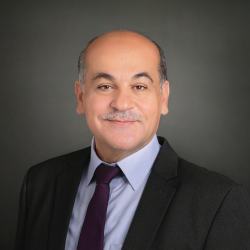
Dr. Muhieddin Amer
Professor and Chair

Dr. Abdulla Ismail
Professor
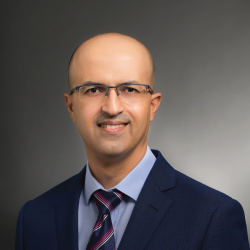
Dr. Wesam Almobaideen
Professor
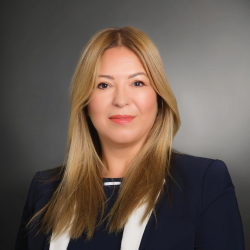
Dr. Boutheina Tlili
Associate Professor

Dr. Khalil Al Hussaeni
Assistant Professor
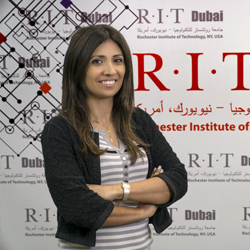
Dr. Jinane Al Mounsef
Assistant Professor
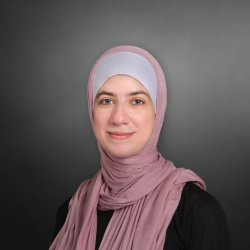
Dr. Huda Saadeh
Assistant Professor
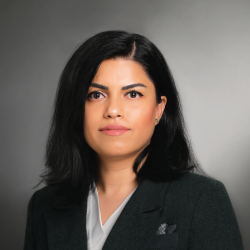
Dr. Kevsar Ovaz Akpinar
Assistant Professor
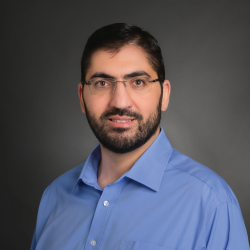
Dr. Omar Abdul Latif
Assistant Professor
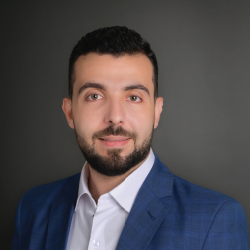
|
Eyad Shihabi Managing Director, BT |
Ghada Elkeissi Head of Professional Services, AWS |
||||||||||
|
Taha Khalifa Regional General Manager, Middle East Intel Corp |
Dr. Ayman ElNashar VP and Head – Technology Architecture, Emirates Integrated
|
||||||||||
|
Ghanim Al Falasi Senior VP – Corporate Services Dubai Silicon Oasis Authority
|
Diyaa Zebian Executive Partner Archinnova |
||||||||||
|
Dr. Mahmoud Sherif Head of Technology and IT Strategy Emirates Integrated
|
Bashar Kilani Territory Executive - Middle East IBM |
||||||||||
|
Dr. Raed Shubair Senior Advisor, Office of Undersecretary for Research Affiliate, MIT
|